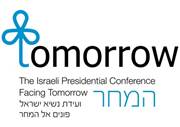- Details

June 20, 2012 – JERUSALEM, Israel – Harvard Professor Niall Ferguson, President of the Council of Foreign Relations, Richard Haass, and Financial Times Reporter Martin Wolf headlined a panel led by Governor of the Bank of Israel Stanley Fischer.
The panel, which focused on the future of the global economy was highlighted by a general sense of pessimism, with several members noting that tough times lay ahead, particularly for Europe.- Details
 June 20, 2012 – Jerusalem, Israel – Peter Beinart, the former editor of The New Republic, and Abe Foxman, Director of the Anti-Defamation League, headlined a panel at the 2012 Israeli Presidential Conference that discussed the evolving relationship between Israel and World Jewry. They were joined by Pierre Besnainou, Chair of the Israel Diaspora Paradigm Committee, Alana Newhouse, Editor-in-Chief of Tablet Magazine, and Leon Wieseltier, literary editor of The New Republic.
June 20, 2012 – Jerusalem, Israel – Peter Beinart, the former editor of The New Republic, and Abe Foxman, Director of the Anti-Defamation League, headlined a panel at the 2012 Israeli Presidential Conference that discussed the evolving relationship between Israel and World Jewry. They were joined by Pierre Besnainou, Chair of the Israel Diaspora Paradigm Committee, Alana Newhouse, Editor-in-Chief of Tablet Magazine, and Leon Wieseltier, literary editor of The New Republic.
- Details
 Cisco's Chambers: "Think Like Your Children"
Cisco's Chambers: "Think Like Your Children"
June 20, 2012 – Jerusalem, Israel – Cisco Chairman John Chambers, Publicis Chairman Maurice Levy, FCC Chairman Julius Genachowski, and Stephane Richard, Chairman and CEO of France Telecom Group, discussed how new media technology is shaping society, education, politics, economics and entertainment in a panel entitled, ‘What's New in New Media,” during the Israeli Presidential Conference.
The panelists discussed the power of new media, and how global citizens, not companies, are responsible for taking technology to new heights.
- Details
 June 20, 2012 – Jerusalem, Israel – Kevin Steinberg, COO and Corporate Secretary of the World Economic Forum, led a panel of experts including James Turley, Chairman and CEO of Ernst & Young, and Pat Gelsinger, President and COO of the EMC Corporation, in which they highlighted challenges today’s business leaders face and offered ideas for modern managers to deal with the these global challenges.
June 20, 2012 – Jerusalem, Israel – Kevin Steinberg, COO and Corporate Secretary of the World Economic Forum, led a panel of experts including James Turley, Chairman and CEO of Ernst & Young, and Pat Gelsinger, President and COO of the EMC Corporation, in which they highlighted challenges today’s business leaders face and offered ideas for modern managers to deal with the these global challenges.
“Social, mobile, cloud, and big data technology forces are driving radical change and we are seeing much more emphasis on global teams who are driven by vision and motivation,” said Gelsinger. “These changes are causing managers to think differently, to set a clear vision that motivates the global team and to know how to do it based on the environment and culture they are in.”
- Details
 June 20, 2012 – Jerusalem, Israel – Jacob Frankel, Chairman of JP Morgan Chase International led a panel of economic experts including former Peruvian President Alejandro Toledo, President of the Global Markets Institute and Senior Investment Strategist at Goldman Sachs, Abby Joseph-Cohen, Chairman of Bank Hapoalim, Yair Seroussi and Dr. Jacques Attali in analyzing the current state of the world economy.
June 20, 2012 – Jerusalem, Israel – Jacob Frankel, Chairman of JP Morgan Chase International led a panel of economic experts including former Peruvian President Alejandro Toledo, President of the Global Markets Institute and Senior Investment Strategist at Goldman Sachs, Abby Joseph-Cohen, Chairman of Bank Hapoalim, Yair Seroussi and Dr. Jacques Attali in analyzing the current state of the world economy.
“We are facing a huge challenge worldwide with enormous potential for growth,” said Attali. “Even with the 2008 financial crisis, the world is growing faster now than in any other period of time in history. However, in Europe specifically, we need to move from techno-federalism to a political federalism model like in the U.S., this will avoid collapse of the Euro.”








